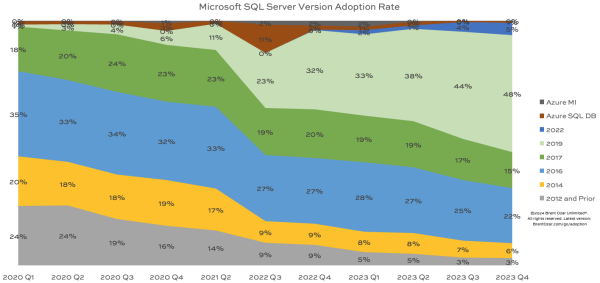The short story: SQL Server 2019 continues its utter domination of the Microsoft data platform landscape this quarter.
The long story: ever wonder how fast people are adopting new versions of SQL Server, or what’s “normal” out there for SQL Server adoption rates? Let’s find out in the winter 2023 version of our SQL ConstantCare® population report.
Out of the thousands of monitored SQL Servers, SQL Server 2019 is now at 48% of the market! That’s the highest percentage we’ve seen for any version in the 3 years that we’ve been doing this analysis, up from last quarter’s 44% market share. Here’s how adoption is trending over time, with the most recent data at the right:
SQL Server 2019 still continues to grow while everything else shrinks, with the exception of 2022 treading water:
- SQL Server 2022: 5%, up from 4% last quarter
- SQL Server 2019: 48%, up from 44%
- SQL Server 2017: 15%, down from 17%.
- SQL Server 2016: 22%, down from 25%
- SQL Server 2014: 6%, down from 7%
- The remaining 4% is Azure SQL DB, Managed Instances, and all prior boxed product versions.
SQL Server 2014 goes out of support in July 2024, so if you’re still running 2014 (or prior) in production, it’s time to make those transition plans to get onto a supported version.
Like I mentioned in the last report, SQL Server 2017 is looking like the version that time forgot. People are skipping over it and going straight to 2019. I’m now convinced that SQL Server 2022 is going to suffer the same fate, given that it still isn’t finished yet. Folks who wanted the headline feature, the ability to fail over back & forth to Managed Instances in the cloud, have probably already given up on 2022 and are sitting it out til the next version.
There was an interesting discussion on Reddit asking if SQL Server 2022 is the final on-premises release, and I doubt that’d be the case. However, Microsoft has to get the next version right and avoid another 2022 fiasco. It’ll be interesting to see what Microsoft shows at the next SQLBits conference in March. There are Microsoft sessions that haven’t been announced yet, and it’s possible that they’ll do a demo or two showing what they’ve got up their sleeves for vNext.
I just gotta take that stuff with a grain of salt because leading up to prior releases, they demoed Availability Groups in Kubernetes, Big Data Clusters, and failovers back & forth to Managed Instances, and we know how those releases went.



4 Comments. Leave new
It would be nice to know how many servers this is for. And what’s with the 2022Q3 number of Azure SQL DB that then disappeared again the following quarter?
Brent commented on the low amount of Azure DBs in a previous installment of the report:
https://www.brentozar.com/archive/2022/12/sql-constantcare-population-report-winter-2022/
Quote:
“Okay, next up – adoption trends over time. You’re going to be tempted to read something into this chart, but I need to explain something first: we saw a huge drop in Azure SQL DB users for SQL ConstantCare. In the past survey, we had exactly 500 Azure SQL DBs being monitored – and this round, it dropped to just 64. I talked briefly with a couple of the SaaS customers who stopped monitoring their databases, and they both said the same thing: “We’re not going to change the app’s code or indexes based on what you found, so we’re not going to monitor it further.” That’s fair – throwing cloud at it is a perfectly legit strategy.”
Unquote
I suspected something like that. Thanks, I hadn’t seen that.
[…] Brent Ozar performs an implicit survey: […]